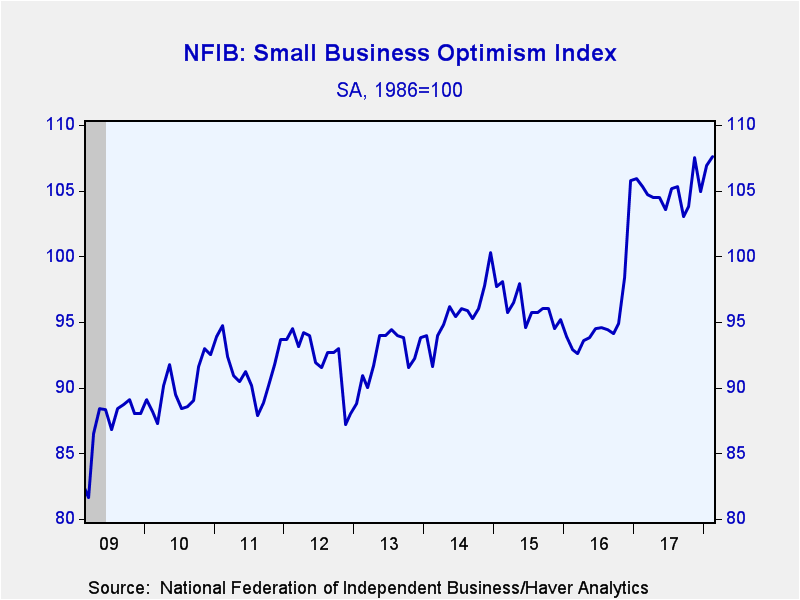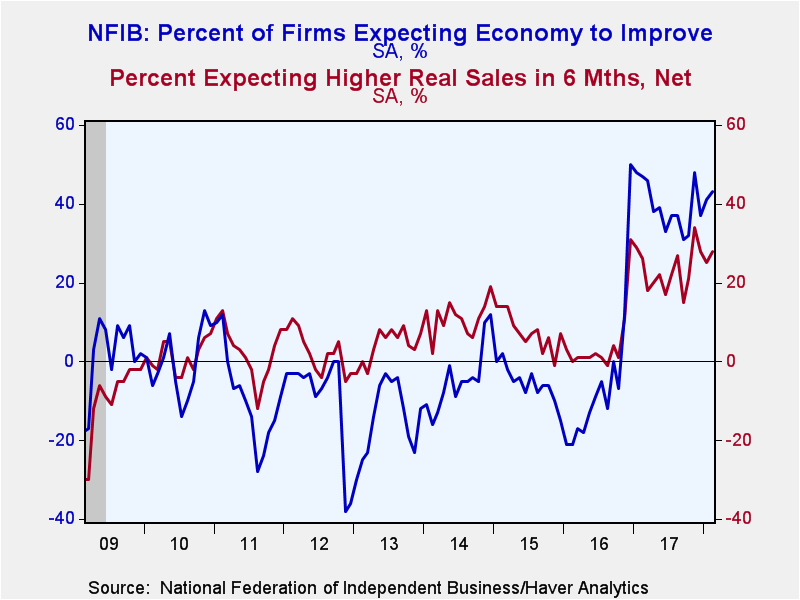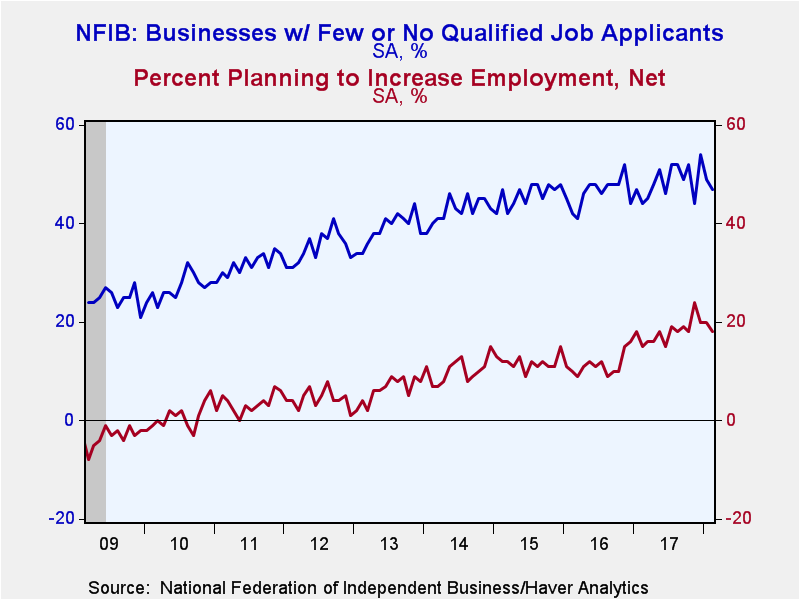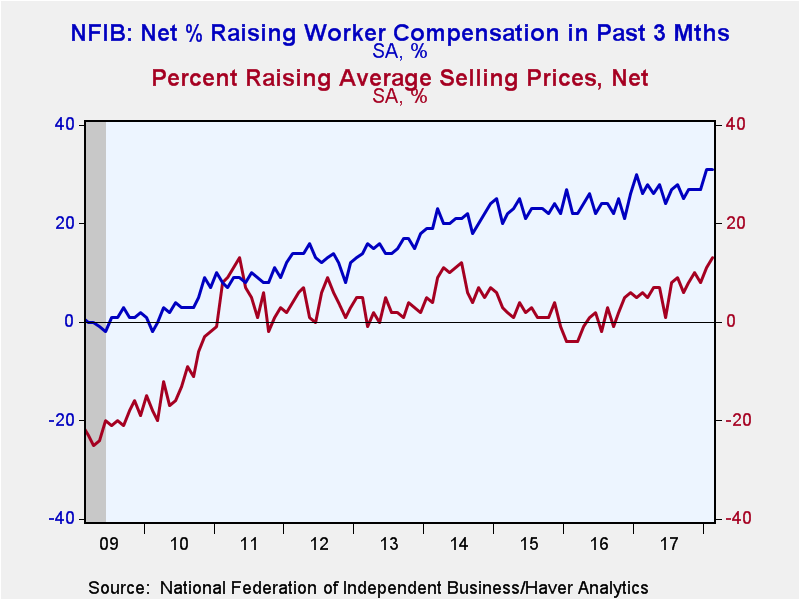 Global| Mar 13 2018
Global| Mar 13 2018U.S. Small Businesses Optimism Improves While Prices Increase
by:Tom Moeller
|in:Economy in Brief
Summary
The National Federation of Independent Business indicated that its Small Business Optimism Index for February increased 0.7% to 107.6 (2.2% y/y) following a 1.9% January rise. The level of optimism was the highest since 1983. A higher [...]
The National Federation of Independent Business indicated that its Small Business Optimism Index for February increased 0.7% to 107.6 (2.2% y/y) following a 1.9% January rise. The level of optimism was the highest since 1983.
A higher forty-three percent of firms expected the economy to improve. That was up versus a Q3'17 low of 31%, but was lower than 47% one year ago. Twenty-eight percent of firms were expecting higher real sales, up from 26% last February. Eighteen percent of businesses were planning to increase employment, improved from 15% last February, and a lessened 47% indicated that there were few or no qualified candidates for job openings.
Pricing pressure continues to pick up as 13% of firms raised average selling prices, the most since May 2011. Twenty-four percent of firms are planning to raise prices, up from 17% during all of 2015 and 2016.
Offering higher wages continued to be necessary to meet staffing requirements. Thirty-one percent of firms actually raised worker compensation, the most since 2000 and up from 27% during all of last year. Businesses planning to raise compensation eased m/m, but remained in record territory.
Finding the financial resource to expand the business was relatively easy as just three percent of businesses reported difficulties in obtaining credit.
This survey inquires about problems facing small business. Labor quality is a major issue for 22% of firms, the most since 1998. Government issues became less worrisome. Taxes were indicated by a sharply reduced 15% as the biggest problem, and government requirements were troublesome by a lessened 15% of businesses. Insurance costs and availability were mentioned by a sharply increased 12% of firms, the most since 2008. Labor costs, though, are a major concern for a low and steady 6% of companies. That was up from three percent in 2012. Poor sales were a concern for an increased 11% of firms. Competition from large firms was the biggest problem for a higher 10% of small firms. Inflation was mentioned by only two percent of firms as a difficulty. Similarly, just two percent report that financial conditions and interest rates are a problem.
Roughly 24 million small businesses exist in the U.S. and they create 80% of all new jobs. The index is based 1986=100). The typical NFIB member employs 10 people and reports gross sales of about $500,000 a year. The NFIB figures can be found in Haver's SURVEYS database.
| National Federation of Independent Business (SA, Net % of Firms) | Feb | Jan | Dec | Feb'17 | 2017 | 2016 | 2015 |
|---|---|---|---|---|---|---|---|
| Small Business Optimism Index (1986=100) | 107.6 | 106.9 | 104.9 | 105.3 | 104.9 | 95.3 | 96.1 |
| Firms Expecting Economy To Improve | 43 | 41 | 37 | 47 | 39 | -5 | -5 |
| Firms Expecting Higher Real Sales | 28 | 25 | 28 | 26 | 23 | 5 | 8 |
| Firms Reporting Now is a Good Time To Expand the Business | 32 | 32 | 27 | 22 | 23 | 10 | 12 |
| Firms Planning to Increase Employment | 18 | 20 | 20 | 15 | 18 | 11 | 12 |
| Firms With Few or No Qualified Applicants For Job Openings (%) | 47 | 49 | 54 | 44 | 49 | 46 | 46 |
| Firms Reporting That Credit Was Harder To Get | 3 | 3 | 3 | 4 | 4 | 5 | 4 |
| Firms Raising Average Selling Prices | 13 | 11 | 8 | 6 | 7 | 0 | 2 |
| Firms Raising Worker Compensation | 31 | 31 | 27 | 26 | 27 | 24 | 23 |
Tom Moeller
AuthorMore in Author Profile »Prior to joining Haver Analytics in 2000, Mr. Moeller worked as the Economist at Chancellor Capital Management from 1985 to 1999. There, he developed comprehensive economic forecasts and interpreted economic data for equity and fixed income portfolio managers. Also at Chancellor, Mr. Moeller worked as an equity analyst and was responsible for researching and rating companies in the economically sensitive automobile and housing industries for investment in Chancellor’s equity portfolio. Prior to joining Chancellor, Mr. Moeller was an Economist at Citibank from 1979 to 1984. He also analyzed pricing behavior in the metals industry for the Council on Wage and Price Stability in Washington, D.C. In 1999, Mr. Moeller received the award for most accurate forecast from the Forecasters' Club of New York. From 1990 to 1992 he was President of the New York Association for Business Economists. Mr. Moeller earned an M.B.A. in Finance from Fordham University, where he graduated in 1987. He holds a Bachelor of Arts in Economics from George Washington University.
More Economy in Brief
 Global| Feb 05 2026
Global| Feb 05 2026Charts of the Week: Balanced Policy, Resilient Data and AI Narratives
by:Andrew Cates










